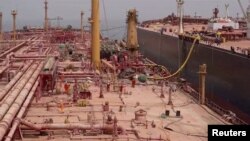The United Nations said Friday that it has successfully completed a complex operation to transfer more than a million barrels of oil from an aging supertanker off Yemen’s Red Sea coast onto a salvage vessel, averting a potential environmental catastrophe.
“We have, I think against many odds, managed to complete an operation that many talked about for years,” U.N. Development Program Administrator Achim Steiner told reporters in a video call. “Many were concerned it couldn’t really be done. Many questioned why it took the U.N. [so] long to implement it."
The planning, fundraising and obtaining permissions from the local authorities took years. The actual transfer of the oil took 18 days of around-the-clock pumping.
Steiner noted that when the United Nations was asked to undertake the operation, there was no one else ready or prepared to do it.
The U.N. has raised about $121 million of the $143 million needed to purchase a large crude carrier, retain a global salvage company, enlist experts, insure a dangerous operation in a war zone and carry out complicated logistics.
The supertanker, the Safer, will next be towed, environmentally cleaned and taken to a green scrap yard for recycling. Steiner said funds from the scrap sale would go toward covering the deficit in finishing the operation. No agreement has been reached between the Yemeni government and the Houthis on the sale of the oil, but the U.N. says it is continuing to work with the parties.
“I welcome the news that the transfer of oil from the FSO Safer has been safely concluded today,” U.N. Secretary-General Antonio Guterres said in a statement. “The United Nations-led operation has prevented what could have been an environmental and humanitarian catastrophe on a colossal scale.”
The tanker was the subject of more than three years of appeals from the U.N. and environmental organizations who warned that a lack of maintenance during Yemen’s civil war meant the nearly 50-year-old vessel was at risk of spilling four times as much oil as happened in the 1989 disaster involving the Exxon Valdez off the coast of Alaska. Experts said if the tanker leaked or exploded, the environmental and economic damage could have cost $20 billion.
The Safer was moored in an area controlled by Iranian-backed Houthi rebels, who have been at war with the Saudi-backed internationally recognized Yemeni government for eight years. The U.N. had sought access to the vessel for several years, but the Houthis withheld the necessary permissions and security guarantees until last year.
Raising the money for the $143 million operation further delayed it.
The United States welcomed the successful transfer operation, to which Washington contributed $10 million. It is one of 23 countries that have contributed to financing the operation. Funding has also come from the private sector and a crowdfunding campaign.
“This operation serves as a strong model for future international coordination and cooperation to proactively prevent crises before they occur,” Secretary of State Antony Blinken said in a statement. “We commend the U.N. and the Yemeni parties who came together to avert an environmental, economic and humanitarian disaster.”




